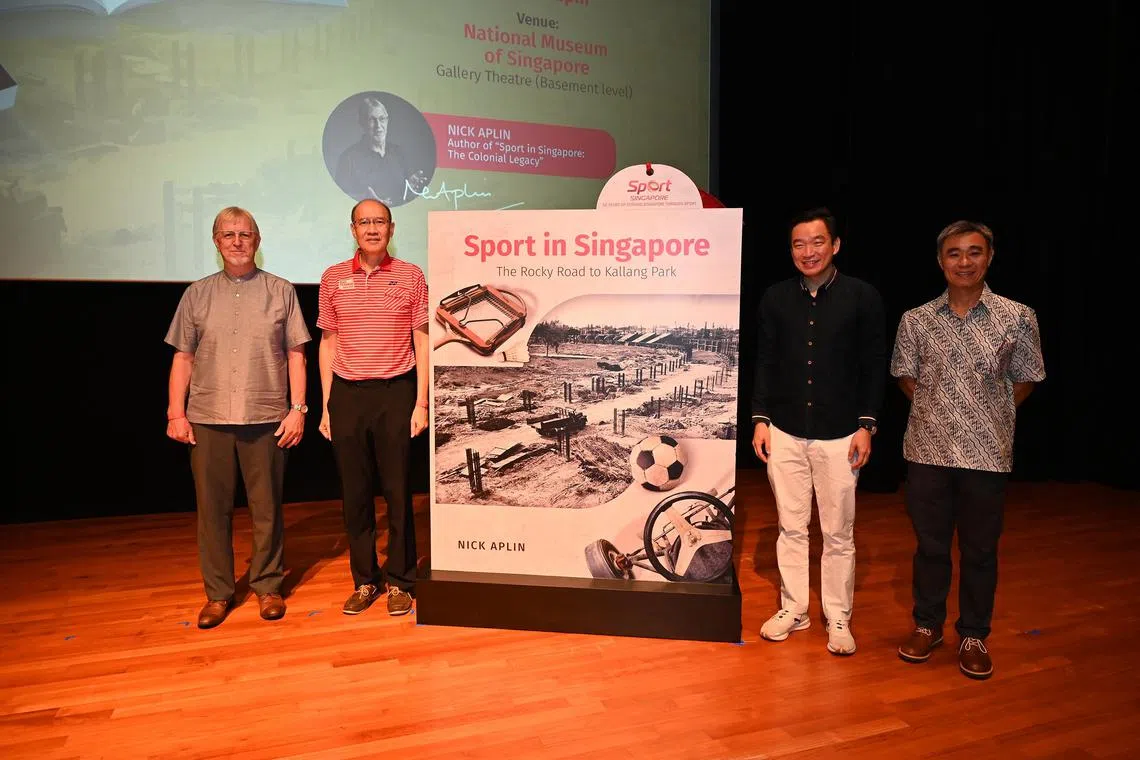Sport Singapore launches book on Republic’s sporting heritage
Sign up now: Get the biggest sports news in your inbox

(From left) Author Dr Nick Aplin, SportSG chairman Kon Yin Tong, Senior Parliamentary Secretary for Culture, Community and Youth Eric Chua and SportSG deputy chief executive officer Toh Boon Yi.
PHOTO: SPORT SINGAPORE
SINGAPORE – A policeman who was paralysed from waist down after being shot in the back in 1950 went on to become the first man to represent Singapore in an international sporting event for the disabled.
That man was Abdul Wahid Baba, who competed in javelin, table tennis and snooker at the 1962 Commonwealth Paraplegic Games in Perth. He later became an advocate for wheelchair sports.
The late Abdul Wahid’s story is among those that author Nick Aplin, Sport Singapore’s deputy director of sport heritage, hopes will be remembered by future generations through SportSG’s latest book, Sport In Singapore: The Rocky Road To Kallang Park.
The 339-page book was launched at the National Museum of Singapore on Saturday, in commemoration of SportSG’s 50th anniversary.
Besides exploits by Singapore’s pioneer athletes, the book also chronicles the country’s sporting transformation from the late 1940s to 1973, when the old National Stadium officially opened. The Singapore Sports Council, which was what SportSG was formerly known as, was also formed that year.
The book is the second part of a trilogy, and the third book, Sport In Singapore: Visions For Change, will be launched later in 2023.
The first book, Sport In Singapore: The Colonial Legacy, was published in 2019. It explored the development of sport in Singapore in the colonial period, from the early 19th century up until self-government was established in 1959.
SportSG chairman Kon Yin Tong said that the trilogy is “aimed at reminding Singaporeans of our history and to encourage us to learn from the past”.
“We recognise the importance of Singapore’s sporting heritage and want to formalise a record of it,” he said.
Dr Aplin said he wanted to include pioneer athletes who had played a part in the Singapore sports scene, but whose names may have been forgotten.
Besides Abdul Wahid, other athletes featured include weightlifter Chay Weng Yew, who finished sixth out of 22 at the 1952 Helsinki Olympics despite not having a coach.
Dr Aplin said: “We can discover interesting things about sport in the past, find out who are the pioneers who are largely unknown, and give them the acknowledgement they deserve.”
Former national swimmer Patricia Chan, who was at the launch, felt he had done a “sterling job” with this book.
The winner of 39 South-east Asian Peninsular Games
Former national water polo vice-captain Yip Ren Kai, who was part of a review panel for the book, felt that the stories resonated well with his experiences.
Yip, who was part of the SEA Games gold-winning teams in 2005, 2007 and 2009, said: “(The book) keeps us motivated with the journeys that our predecessors went through. It is important for us to hold their legacies. As an athlete, sacrifices will always have to be made, but the returns we get are immeasurable.”
Two-time Olympian C. Kunalan,
When asked to compare competing in the past and present, the 80-year-old said: “What hasn’t changed is the passion in our athletes. The support from Singaporeans is very much up there.”
Yip hopes Singaporeans can continue supporting current and future athletes as they perform on the big stage.
“Singaporeans need to stand behind Team Singapore because these are (our) best athletes... and we need a community that stands behind our athletes. We need to give them the platform to be able to thrive,” he said.


